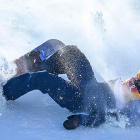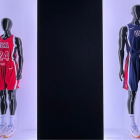The Olympics are many things. They're a worldwide spectacle of athletic prowess, they're an opportunity for displays of unity that aren't often seen outside of sport, but above all else, they're a potential cash cow. Why else would the most strenuous athletic competitions in the world feature a sponsorship with McDonalds of all places? Viewers were reminded of the money involved in the games on NBC on Sunday night in the women's slopestyle, when Jamie Anderson won gold in some of the most dangerous snowboarding conditions imaginable.
Cold was always an issue heading into Pyeongchang, but when it comes to snowboarding, there are other factors to consider. One of those factors -- wind -- was a huge impediment to those that were on the course. The final was condensed from three runs to two because of the conditions, and Anderson's first run score of 83 held up for gold and was easily the best run of the day. She finished nearly seven points ahead of silver medalist Laurie Blouin from Canada.
"I'm not extremely proud of my run," Anderson said after winning, via the Associated Press.
And that's insane. For a gold medalist to not be impressed with herself after winning gold. It's a testament to the truly dangerous conditions that these riders were subjected to.
The process that got the riders in this mess was, frankly, a mess as well. The qualifying round was scrapped due to wind the day before, and the riders were summoned back for a final that consisted of two runs. They were ordered by world ranking, which allowed Anderson, No. 1 in the world, the opportunity to go last.
The viewers were also robbed, in a way. The most exciting women's snowboarders in the world couldn't let rip with their best runs because of the wind, Anderson included. Her win was largely the product of staying upright on a day when 41 of 50 runs saw riders crash or pull up on jumps.
"I was trying to keep the spirits high, like, 'Let's run it,'" Anderson said, per the AP. "A handful of the girls were like, 'No, it's not safe,' and things like that. It's not like what we're doing is safe, anyhow."
There's unsafe, of course, and then there's outright dangerous. Obviously someone with Anderson's mindset would run the course no matter the weather. And other racers were impacted. "All I wanted to do was sit up top and cry," said Norway's Silje Norendal, per the AP, who finished just outside of a medal at fourth place.
Some female snowboarders are livid that the slopestyle contest is being run today. “It’s a shitshow,” said Dutch rider Cheryl Maas. Nearly all of the women in the field have crashed on account of the exceedingly windy conditions.
— Jeff Passan (@JeffPassan) February 12, 2018
It was ugly and, frankly, unentertaining. But viewers were concerned about a lot more than their own entertainment. They took notice of the fact that the riders were putting themselves in legitimately compromising situations -- even if they didn't necessarily have to.
Some riders just coasted to the bottom, pulling up before even attempting jumps. They finished with decent-to-good scores just on virtue of not wiping out -- which probably isn't the run of a lifetime most of them had in mind after spending four years preparing for their moment on-stage.
The other glaring question was why the slopestyle went off while the women's giant slalom was canceled because of high winds the day after the men's downhill was called for the same reason. The International Ski Federation's contest director, Roby Moresi, attempted to address swirling concerns that it was due to TV rights that "the show must go on," so to speak.
"We didn't get much of a pushback," Moresi said, via the AP. "Of course, there's a lot at stake and maybe they don't express as much. But we only got complaints from one team. Others were comfortable. Others were telling me, 'You did the right thing by making it happen.'"
The FIS also told the AP that winds were worse in other parts of the mountain, and that contributed to the decision to leave some events going.
In a statement, the FIS further tried to dissipate the rumors.
"The first priority for FIS is the safety of the athletes and FIS would never stage a competition if this could not be assured," it said. The statement went on to say: "The nature of outdoor sports also requires adapting to the elements."
Norendal, however, felt that status also played a part. "When it's alpine, they have a higher status," Norendal said, per Yahoo Sports' Jeff Passan. "And they really want a good show. I feel like we're definitely coming in second. We can actually get super hurt. And it's just really unfair. It's such a young sport. It's just sad that we all feel sometimes that we're coming in second."





















